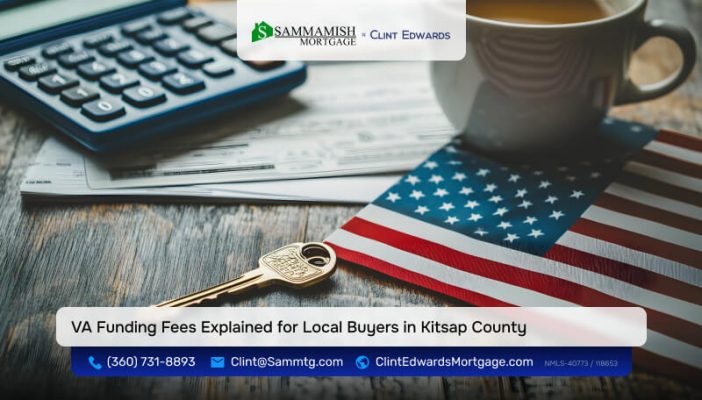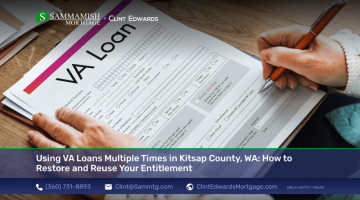No Obligation and transparency 24/7. Instantly compare live rates and costs from our network of lenders across the country. Real-time accurate rates and closing costs for a variety of loan programs custom to your specific situation.

If you’re a veteran or active-duty service member in Silverdale, Bremerton, or Port Orchard, you may already know that VA loans make homeownership possible with $0 down and no private mortgage insurance (PMI). But one cost that often surprises first-time buyers is the VA funding fee.
This one-time charge helps keep the VA home loan program running for future generations of veterans — and while it’s not the same as mortgage insurance, it’s important to understand how it works, when you pay it, and who might be exempt.
At Clint Edwards Mortgage, powered by Sammamish Mortgage, we help Kitsap County veterans navigate every step of the process — from COE eligibility to calculating the funding fee to exploring exemptions.
Let’s break down what the VA funding fee is, how it’s calculated, and what it means for local buyers.
The VA funding fee is a one-time cost charged by the Department of Veterans Affairs (VA) to most borrowers using a VA loan. It helps offset the program’s cost to taxpayers while ensuring that veterans continue to enjoy major benefits like no down payment and no PMI.
Unlike conventional or FHA loans — which require monthly mortgage insurance if you put less than 20% down — the VA funding fee is paid only once and can even be rolled into your loan amount.
💡 Why it matters: The funding fee ensures that future generations of veterans can access the same zero-down, no-PMI loan benefits without additional taxpayer burden.
Funding-fee rates are set nationally by the VA, but they apply equally to buyers in Kitsap County — including Silverdale, Bremerton, and Port Orchard.
| Down Payment | First Use | Subsequent Use |
| Less than 5% | 2.15% | 3.30% |
| 5% to 9.99% | 1.50% | 1.50% |
| 10% or more | 1.25% | 1.25% |
| Loan Type | Funding Fee |
| IRRRL (Streamline Refinance) | 0.50% |
| Cash-Out Refinance (first use) | 2.15% |
| Cash-Out Refinance (subsequent use) | 3.30% |
(Sources: VA.gov, Sammamish Mortgage)
Let’s see how this plays out locally:
Even when financed into the loan, these fees are modest compared to ongoing PMI costs found with other loan types.
Not every borrower has to pay it. The VA provides exemptions for certain groups:
✅ Veterans receiving VA disability compensation.
✅ Surviving spouses of veterans who died in service or from a service-connected disability.
✅ Purple Heart recipients (active-duty buyers).
✅ Veterans who would receive disability compensation if they weren’t already receiving retirement pay.
If your exemption status changes after closing — for instance, if you’re later awarded a qualifying disability rating — you can even apply for a refund of the funding fee.
Think of the VA funding fee as the VA’s way of replacing what other loan programs charge as insurance.
| Loan Type | Upfront Fees | Monthly Mortgage Insurance | Cost Over 30 Years |
| VA Loan (No PMI) | 2.15% funding fee | None | One-time cost |
| FHA Loan | 1.75% upfront + 0.55% monthly MIP | Yes, for life of loan | Continuous cost |
| Conventional Loan | None upfront | 0.3%–1.5% monthly PMI until 20% equity | Thousands in recurring fees |
Over the life of a typical 30-year loan, the VA funding fee is usually 60–75% cheaper than PMI — even when financed into the loan.
Yes! You can either pay the fee at closing or roll it into your loan amount.
Example:
A Silverdale buyer finances a $600,000 home with 0% down and a $12,900 funding fee.
That’s still far less than roughly $300+ in PMI most non-VA buyers would pay.
Here are some smart strategies local veterans can use:
When you work with Clint Edwards Mortgage, we’ll run the numbers both ways so you can decide whether it’s better to finance or pay upfront.
Let’s compare two scenarios for a Bremerton home priced at $500,000:
| Scenario | Upfront Payment | Monthly Payment (Est.) | Total Cost Over 5 Years |
| VA Loan (0% down, fee financed) | $0 | $3,290 | $197,400 |
| FHA Loan (3.5% down, PMI) | $17,500 | $3,480 | $208,800 |
Even though the VA buyer finances the funding fee, they still save $190/month and over $11,000 in just five years.
Kitsap County is home to thousands of veterans and active-duty families stationed at Naval Base Kitsap. Roughly 20% of all home purchases in the county use VA financing.
As of 2025:
This means most local veterans will pay between $10,000–$16,000 in funding fees if not exempt — still less than what they’d pay in ongoing PMI over a few years.
If you already have a VA loan, refinancing can trigger a smaller funding fee:
These options let you lower your rate or tap into your home’s equity while maintaining VA benefits.
Buying or refinancing with a VA loan can feel complex, but it doesn’t have to be. Clint Edwards specializes in helping Kitsap County veterans understand every number before they sign.
Ready to find out what your VA funding fee would be — or whether you qualify for an exemption? Contact Clint Edwards Mortgage today.
Q1: Can the VA funding fee be waived?
Yes — veterans with VA-recognized disabilities, eligible surviving spouses, and Purple Heart recipients are exempt.
Q2: How do I know if I’m exempt?
Your Certificate of Eligibility (COE) will show exemption status. Your lender can help you request this through the VA.
Q3: Is the funding fee tax-deductible?
Generally yes, when it’s financed into the loan as part of mortgage interest — consult your tax advisor.
Q4: Does the funding fee change every year?
Rates may adjust slightly, but they’re set by federal law and updated periodically (last major adjustment 2024–2025).
Q5: Can sellers pay the funding fee?
They can’t pay it directly, but they can contribute toward total closing costs (up to 4% of the loan).

Whether you’re buying a home or ready to refinance, our professionals can help.
{hours_open} - {hours_closed} Pacific
No Obligation and transparency 24/7. Instantly compare live rates and costs from our network of lenders across the country. Real-time accurate rates and closing costs for a variety of loan programs custom to your specific situation.
Adjust the parameters based on what you want to track